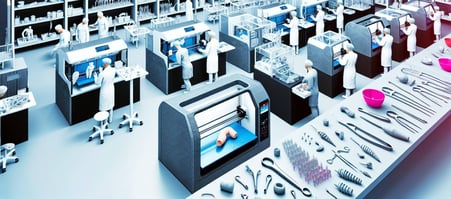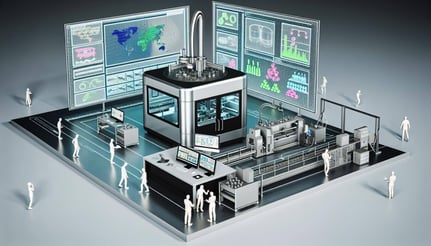Topics: Demand Forecasting, Inventory Management, Real-Time Data, PlanetTogether Software, Integrating PlanetTogether, Efficient Production Planning, Quality Assurance Traceability, Medical Manufacturing
In the world of medical manufacturing, staying competitive and meeting the increasing demand for precision and quality products is a constant challenge. One of the innovative technologies revolutionizing the industry is 3D printing. Its potential in the medical sector is immense, from producing intricate medical devices to custom implants and prosthetics.
However, harnessing the power of 3D printing effectively requires a fundamental shift in production scheduling and integration with Enterprise Resource Planning (ERP), Supply Chain Management (SCM), and Manufacturing Execution Systems (MES) like PlanetTogether, SAP, Oracle, Microsoft, Kinaxis, and Aveva.
In this blog, we will explore the impact of 3D printing on production scheduling and how integration with these systems can streamline operations and enhance efficiency in a medical manufacturing facility.

3D printing, also known as additive manufacturing, has gained prominence in the medical sector for several reasons:
Customization: 3D printing allows manufacturers to create patient-specific medical devices and implants tailored to individual needs. This level of customization was previously unattainable with traditional manufacturing methods.
Speed: 3D printing can significantly reduce lead times, enabling manufacturers to respond quickly to urgent medical needs. This speed is vital in the healthcare sector, where every moment counts.
Cost-Efficiency: While traditional manufacturing processes often involve waste due to subtractive methods, 3D printing minimizes material wastage, making it a cost-effective solution in the long run.
Complex Geometries: 3D printing can produce intricate and complex shapes that are difficult or impossible to achieve with traditional manufacturing methods. This capability is invaluable for producing advanced medical devices.

The adoption of 3D printing in medical manufacturing necessitates a reevaluation of production scheduling strategies. Here's how it impacts scheduling:
On-Demand Production: With 3D printing, manufacturers can shift from mass production to on-demand production. This means scheduling must be flexible and responsive to real-time demands rather than relying on fixed production runs.
Reduced Inventory: Traditional manufacturing often requires maintaining large inventories to meet demand. 3D printing reduces the need for extensive inventory, allowing for a just-in-time approach to production scheduling.
Resource Allocation: 3D printers require different resources than traditional machines. Production scheduling must consider the availability of 3D printers, suitable materials, and skilled operators.
Rapid Prototyping: 3D printing facilitates rapid prototyping, enabling manufacturers to quickly iterate and refine designs. Scheduling should accommodate these iterations and their impact on production timelines.
Quality Control: Quality control processes may need to be adjusted to account for the unique characteristics of 3D-printed products. Scheduling should include adequate time for quality checks and adjustments.

To effectively harness the potential of 3D printing in medical manufacturing, integration with ERP, SCM, and MES systems is crucial.
Let's explore how integration with systems like PlanetTogether, SAP, Oracle, Microsoft, Kinaxis, and Aveva can benefit a plant manager in a medical manufacturing facility:
Real-Time Data: Integration allows for the seamless exchange of data between 3D printers and these systems, providing real-time insights into production progress, material availability, and demand fluctuations.
Demand Forecasting: ERP systems can utilize historical data and predictive analytics to forecast demand accurately. This information can guide production scheduling and resource allocation.
Inventory Management: SCM systems can optimize inventory levels, ensuring that the right materials are available when needed. This is particularly important in 3D printing, where material costs can be significant.
Production Planning: MES systems like PlanetTogether can create detailed production plans that consider the capabilities and constraints of 3D printers, enabling efficient and effective scheduling.
Quality Assurance: Integration allows for the integration of quality control processes into the production schedule, ensuring that each 3D-printed product meets the required standards.
Traceability: ERP systems can track the origin of materials and components used in 3D printing, enhancing traceability and compliance with regulatory requirements.
The integration of 3D printing into medical manufacturing facilities presents exciting opportunities for customization, speed, and cost-efficiency. However, it also requires a fundamental shift in production scheduling strategies. Plant managers in these facilities must embrace flexible, on-demand scheduling approaches that can adapt to the unique characteristics of 3D printing.
Furthermore, integration with ERP, SCM, and MES systems like PlanetTogether, SAP, Oracle, Microsoft, Kinaxis, and Aveva is essential for optimizing operations and maximizing the benefits of 3D printing. These systems provide the real-time data, demand forecasting, inventory management, and production planning capabilities needed to thrive in the ever-evolving field of medical manufacturing.
The future of medical manufacturing is being reshaped by 3D printing, and those who effectively integrate this technology with advanced scheduling systems will lead the way in delivering innovative and life-changing medical solutions.
Topics: Demand Forecasting, Inventory Management, Real-Time Data, PlanetTogether Software, Integrating PlanetTogether, Efficient Production Planning, Quality Assurance Traceability, Medical Manufacturing
0 Comments
No video selected
Select a video type in the sidebar.







LEAVE A COMMENT